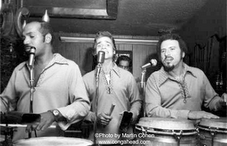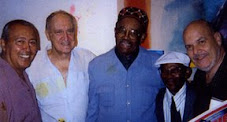
Two octaves below A-major, the ship’s horn of the Fiestamarina signals the sailing from Miami. Un crucero con sabor latino, con tumbao y rumbon, nace un nuevo concepto en la industria maritima, un idea que iba cerciendo paso a paso.
Music has accompanied man’s voyages throughout history. The major naval forces of the world all have their bands; Tito Puente played in one. Roman galleys rowed to the beat of a drum, and King Ludwig floated on a barge in his castle with Richard Wagner. Back in 1807, opulent pleasure boats plied the New York waterways featuring cotillions with large orchestras aboard, ending with fireworks. On whaling ships during months-long hunts, seamen danced to chanties. The French ship Jean Mermoz featured symphony cruises. In Venice, gondoliers row to arias. Circle Line boats have cruises called “Mambo on the Hudson” and “Merengue on the Hudson,” and in Paris the bateaux-mouche sail until dawn playing porros and excellent salsa. From the lone accordionist on the ferry crossing New York Harbor, to the Fiestamarina, with its musical emphasis and Latin musical heritage—a powerful combination. Salsa sobre las olas…salsa on the high seas.
Back in 1948, three ships called the Good Neighbor Fleet sailed from Pier 32, New York, on 38-day cruises to South America. The orchestras of the Brazil, Argentina and Uruguay struggled with Latin rhythms. They played fox trots from New York to Port of Spain, calypso from Trinidad to Bahia, then samba as far as Santos and then from there to Buenos Aires…the tango. Along the coasts of the Caribbean islands, gyroscopic proto-salseros danced on the waters that served as the ideal conductors for the electricity found in Latin music.
It was after the passengers retired that the true Latin spirit manifested itself in the form of the crew conjunto that formed every night on the aft end of the ship. The espantaneo-type band might feature such artists as “Hot Lips” Garcia from El Barrio, and Doroteo Santiago, who popularized “Amor Perido,” “Tu No Comprendes” and “Dolor Cobarde,” right from the Happy Boys at the Park Plaza on 110th Street. Earlier each evening, Hot Lips had played “Malaguena Salerosa” to call the passengers to dinner each night. His trumpet replaced the gong, mournfully echoing in half-time down the long companionways of the ship, from deck to deck.


No comments:
Post a Comment